Port Adelaide hard man David ‘Grave Danger’ Granger dies at 69
One of SA football’s most controversial figures has died after a long health battle.
AFL
Don't miss out on the headlines from AFL. Followed categories will be added to My News.
One of South Australian football’s most controversial figures, Port Adelaide hard man David Granger, has died, aged 69, after a long battle with cancer.
Nicknamed “Grave Danger’’ because of his aggressive approach to the game and the amount of times he was reported, Granger – a dual Magpies premiership player – was powerful and highly skilled but polarising because of his physicality that often floored opponents and saw him earn the wrath of the SANFL tribunal.
He was painted as a villain by opposition supporters.
Granger, who started his football career in Victoria playing under-19s for St Kilda, played
103 games and kicked 92 goals for Port in an injury and suspension-riddled career from 1975-82.
He split his time with the Magpies by spending a season in the VFL with the Saints in 1979, where he played three league games and kicked one goal.

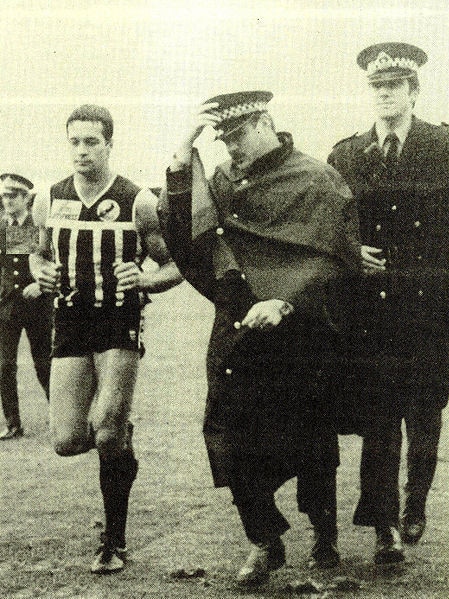
A tremendous talent who seven-time Port SANFL premiership player Tim Ginever described as an “amazing footballer’’, Granger’s league career finished at the end of 1982 following his infamous on-field run-in with Glenelg legend Graham Cornes.
After breaking Tiger Stephen Barratt’s leg in an “accidental collision’’ in the 1982 preliminary final at Football Park, Granger struck Cornes off the ball.
He copped an eight-match ban for hitting Cornes and two for the Barratt incident.
Tiger fans were so upset by the incidents that Granger, who claimed he was sent out by coach John Cahill to hit Cornes, had to be escorted from the oval by police.
A year earlier – in the 1981 grand final – Granger ended Glenelg utility Neville Caldwell’s career with a king-hit.
After the match the Tigers protested which resulted in Granger becoming the first footballer in the SANFL to be suspended on video evidence.
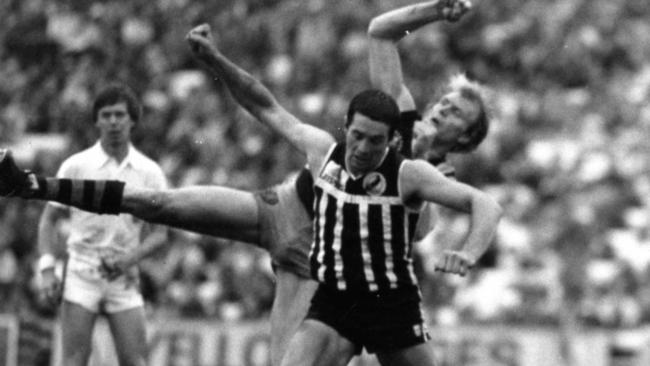
While renowned for having “white line fever’’, Granger could play.
He was a key member of Port’s 1977 and 1981 premiership teams – both grand finals were against Glenelg – and possessed vice-like hands as a key forward, despite measuring a modest 188cm.
Ginever, who trained with Granger but never played with him, said: “A lot of people only remember the incidents he was involved in but, gee, he could play the game, he was an amazing footballer’’.
“His hands were incredible,’’ Gimever told FIVEaa.
“He was only 6 foot, 2 inches in the old terms but he always played a key position and played above his height.
“And his handballing was up there with (Port legends) Russell Ebert and Greg Phillips as far as being able to penetrate and hit blokes on the run.
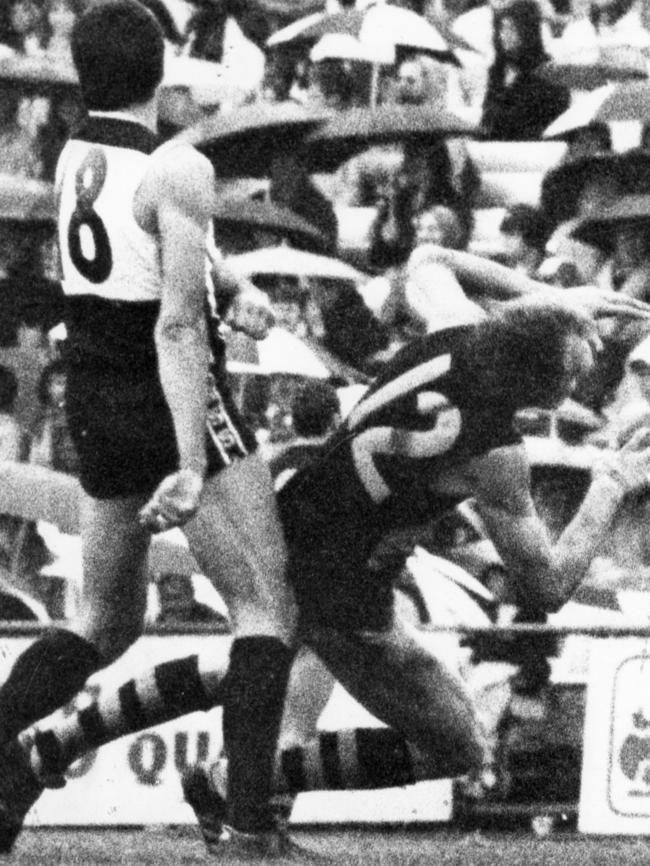
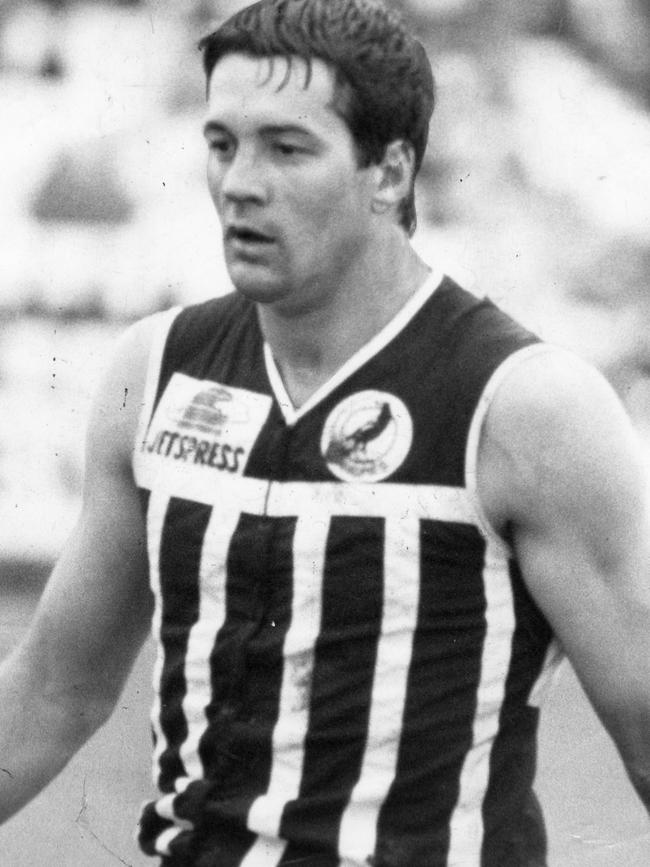
“He was amazing and also an unselfish footballer, that’s what I loved about him, he was always prepared to give the ball off to teammates.
“It was a career that was probably shaded by more dark incidents than good but off the field there was a gentle side to him and I will always remember him fondly.’’
After retiring from the SANFL, Granger moved to Port Pirie to play for Solomontown in the Spencer Gulf Football League.
Port chief executive Matthew Richardson said Granger struggled with health issues in recent years.
“The Port Adelaide Football Club extends its condolences to David’s daughter Carly and family,” Richardson said.
“David was an incredibly talented player during Port Adelaide’s reign in the late 1970s and early 1980s.
“He was a modern-day type player … athletic and strong. David was exceptionally talented and was instrumental in the club’s drought-breaking 1977 grand final victory.”
Granger’s 1981 premiership captain Brian Cunningham said “his football talent and enormous skills were often underplayed due to his notoriety.”
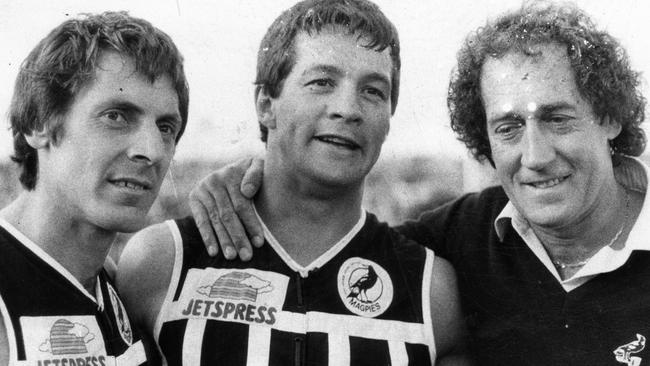
“David predominantly played as a strong centre-half-forward in an era when it was a very difficult position to play,” Cunningham said.
“He could reach high and take a powerful pack mark and possessed a beautiful, long kick.
“David played a crucial role in our premiership success in 1977 and 1981, establishing a formidable partnership with full forward Tim Evans.
“He was a focal point for our game plan and if he didn’t mark the ball he would always bring it to ground and provide opportunities for others to benefit.
“He was misunderstood by others outside the club and sadly I don’t think we ever saw the best of David’s raw talent consistently on the field.”
In 2007, Granger was interviewed for the Today Tonight program and said: “I was a good soldier. I did what I was told … the culture of football at the time was to win at all costs”.
Granger battled depression after his playing career and was involved in off-field controversy, including spending time in jail.





